Delta Airlines
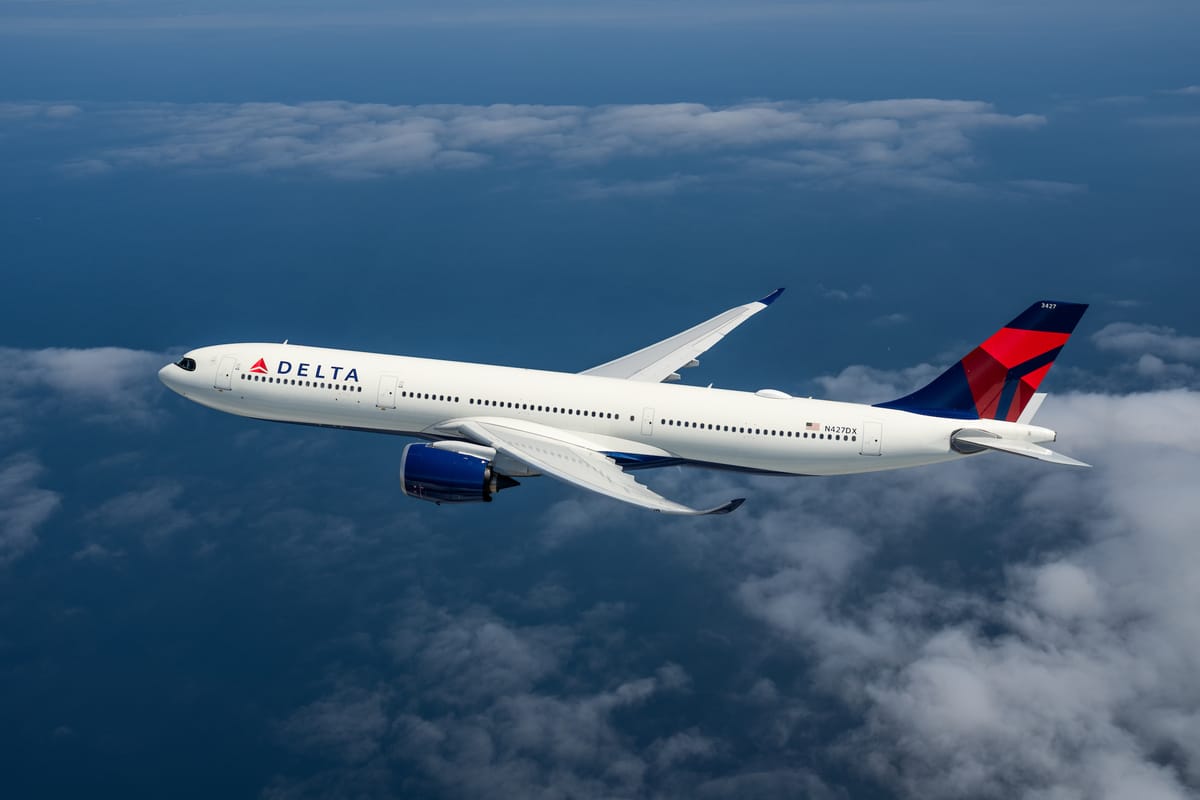
History and Background
Delta AirLines, founded on March 2, 1925, in Macon, Georgia, began as Huff Daland Dusters, the world's first aerial crop-dusting company. The company's journey from agricultural aviation to becoming a major global carrier is a testament to its adaptability and vision.
Key Milestones:
- 1929: Began passenger operations as Delta Air Service
- 1941: Moved headquarters to Atlanta, Georgia
- 1953: Launched first international routes
- 1970: Achieved an all-jet fleet
- 1981: Introduced its frequent-flyer program
- 1997: First airline to board over 100 million passengers in a year
Today, Delta stands as the United States' oldest operating airline and the seventh-oldest worldwide. With over 5,400 daily flights serving 325 destinations across 52 countries, Delta has established itself as a cornerstone of global aviation.
Key Hubs and Routes

Delta's strategic network of hubs forms the backbone of its operations, facilitating efficient connections and expanding its global reach.
Major Domestic Hubs:
1. Atlanta (ATL)
- Delta's largest and busiest hub
- Offers connections to over 200 destinations
- Accounts for approximately 20% of Delta's total departing seats
2. Minneapolis-St. Paul (MSP)
- Key hub for upper Midwest connections
3. Detroit (DTW)
- Important gateway for Asian routes
4. Salt Lake City (SLC)
- Vital hub for Intermountain West region
5. New York (JFK and LaGuardia)
- JFK focuses on international flights
- LaGuardia caters to domestic connectivity
6. Seattle-Tacoma (SEA)
- Newest hub, focusing on West Coast and Asian flights
International Hubs:
1. Amsterdam (AMS)
- Delta's largest international market
- Nonstop flights from multiple U.S. hubs
2. Tokyo (HND)
- Key Asian hub
Notable Routes:
- Busiest domestic route: Atlanta-Orlando
- Top international route by revenue: Atlanta-London Heathrow - Significant Florida presence: Atlanta to Fort Lauderdale and Tampa
Delta's hub system enables it to optimize operations, expand routes, and enhance service reliability. This network strategy has been crucial in establishing Delta as a leader in the global aviation industry, connecting millions of passengers across six continents.
Delta Air Lines: A Global Aviation Leader
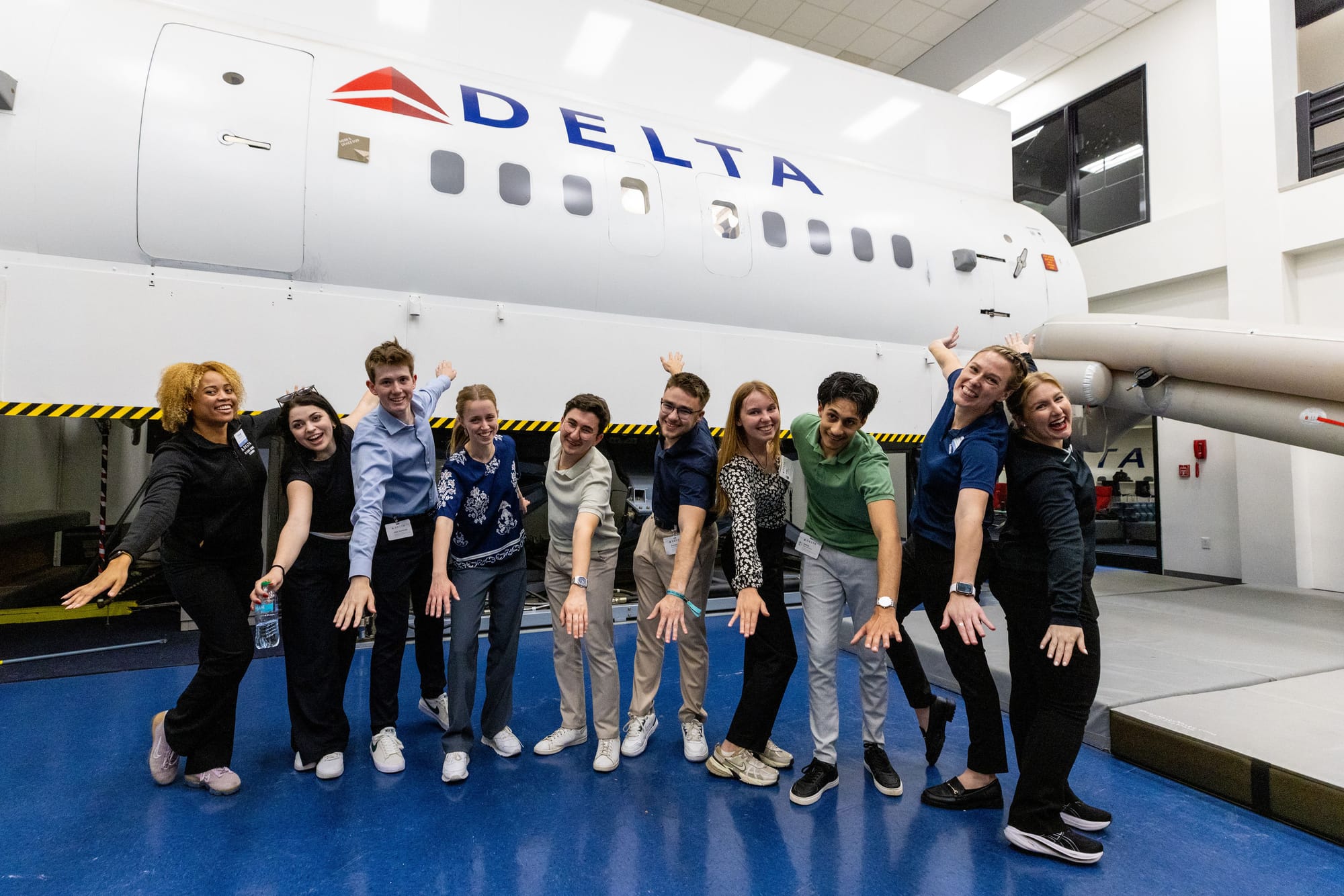
Market Position
Delta Air Lines has established itself as one of the premier carriers in the global aviation industry, consistently ranking among the top airlines worldwide.
U.S. Market Strength:
- Second-largest airline in the United States by number of passengers carried, passenger miles flown, and fleet size
- Largest U.S. airline by revenue for commercially owned airline companies - Highest brand value among U.S. airlines
Global Recognition:
- Ranked 113th on the Fortune 500 list
- One of the world's oldest operating airlines (7th oldest globally)
Ranking Among U.S. Airlines
Delta consistently performs well in various airline rankings, showcasing its commitment to service excellence and operational efficiency.
The Points Guy 2024 Rankings:
1. Delta Air Lines (1st place for the sixth consecutive year)
2. Alaska Airlines
3. United Airlines
4. American Airlines
Key Performance Areas:
- Reliability: Top performer in timeliness, with the lowest rates of cancellations, delays, mishandled luggage, and denied boardings
- Customer Experience: Tied for first place with JetBlue Airways in comfort and in-flight amenities
- Loyalty Program: Ranked high, although faced criticism for recent SkyMiles program changes
WalletHub 2024 Rankings:
- 4th overall among U.S. airlines
- Excelled in reliability metrics
Global Presence
Delta's extensive network and strategic partnerships have solidified its position as a major player in international aviation.
Route Network:
- Serves 325 destinations across 52 countries on six continents
- Operates over 5,400 flights daily
International Hubs:
- Amsterdam (AMS): Largest international market for Delta
- Tokyo (HND): Key Asian hub
Global Alliances:
- Founding member of the SkyTeam airline alliance
- Codeshare agreements with 26 airlines worldwide
Key International Routes:
- Top revenue-generating international route: Atlanta-London Heathrow - Significant presence in European markets, particularly Amsterdam and Paris - Unique routes among U.S. carriers, including service to Dakar, Stockholm, and Copenhagen
Delta's strong market position, high rankings among U.S. airlines, and extensive global presence demonstrate its status as a leader in the aviation industry. The airline's focus on reliability, customer experience, and strategic network expansion continues to drive its success in both domestic and international markets.
Delta Air Lines: Financial Performance Overview

Revenue Growth
Delta Air Lines has demonstrated resilient revenue growth despite challenges in the aviation industry:
- Q3 2024 operating revenue: $15.7 billion, a 1.2% increase year-over-year - Full-year 2023 revenue: $4.609 billion, a significant 249.7% increase from 2022 - Projected revenue growth: 2.5% annually over the next three years
Q4 2024 Forecast:
- Total revenue expected to grow 2% - 4% year-over-year
Net Income Trends
Delta's net income has shown strong recovery and growth:
- Q3 2024 net income: $1.27 billion, a 15% improvement from Q3 2023
- Full-year 2023 net income: $4.609 billion, up 249.7% from 2022
- 2022 net income: $1.318 billion, a 370.71% increase from 2021
Recent Performance:
- Q2 2024 net income: $1.305 billion (28.57% decline year-over-year) - Twelve months ending June 30, 2024: $4.487 billion (50.22% increase year-over-year)
Historical Context:
Year-Net Income (Millions USD)|
2023-4,609
2022-1,318
2021-280
2020-12,385
2019-4,767
Dividend History
Delta Air Lines has recently reinstated its dividend program:
- Current quarterly dividend: $0.15 per share
- Declaration date: September 19, 2024
- Record date: October 10, 2024
- Payment date: October 31, 2024
Dividend Reinstatement:
- Delta suspended its dividend in March 2020 due to the COVID-19 pandemic - The company resumed dividend payments in 2023, signaling financial recovery and confidence in future performance
Delta's financial performance shows a strong recovery from the pandemic-induced downturn, with consistent revenue growth and a return to profitability. The reinstatement of dividends further underscores the company's improving financial health and commitment to shareholder returns. However, the airline industry remains subject to various external factors, and Delta continues to navigate challenges such as fuel price fluctuations and global economic conditions.
Delta Air Lines: Fleet and Operations Overview
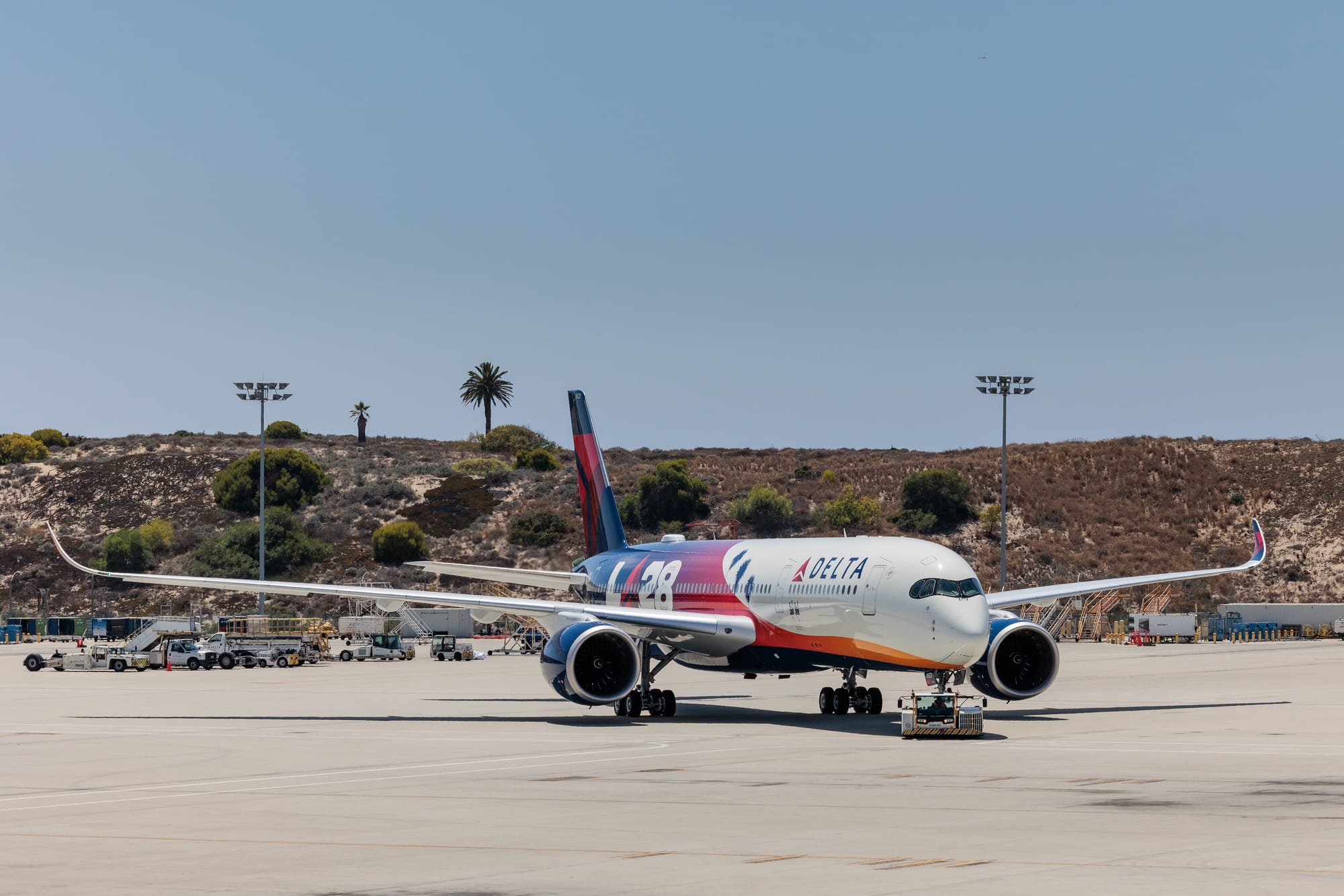
Aircraft Types
Delta Air Lines operates one of the largest and most diverse fleets in the global aviation industry:
Total Fleet Size: 990 mainline aircraft (as of September 2024)
Key Aircraft Types:
- Airbus A220: 71 in service (45 A220-100 and 26 A220-300)
- Airbus A320 Family: 241 in service (57 A319, 57 A320, 127 A321-200, 65 A321neo) - Airbus A330: 72 in service (11 A330-200, 31 A330-300, 30 A330-900) - Airbus A350: 33 A350-900 in service, 20 A350-1000 on order
- Boeing 717: 88 in service
- Boeing 737: 240 in service (77 737-800, 163 737-900ER)
- Boeing 757: 118 in service (102 757-200, 16 757-300)
- Boeing 767: 62 in service (41 767-300ER, 21 767-400ER)
Fleet Highlights:
- World's largest operator of Airbus A220, Boeing 717, and Boeing 757 - Largest passenger fleet of Boeing 767
- Largest Airbus A330 fleet among U.S. airlines
Passenger Numbers
Delta has consistently ranked among the top airlines in terms of passenger traffic:
- Q3 2024: Carried approximately 56 million passengers
- 2023 Full Year: Boarded 162.3 million passengers (company record) - 2022 Full Year: Transported 152 million passengers
Growth Trend:
Delta has shown a strong recovery in passenger numbers post-pandemic, with 2023 figures surpassing pre-pandemic levels.
Load Factors
Load factor is a key metric indicating the efficiency of an airline's capacity utilization:
- Q3 2024: 87% (1 percentage point decrease year-over-year)
- 2023 Full Year: 84%
- 2022 Full Year: 83%
Delta's load factors have shown consistent improvement since the pandemic-induced lows, approaching and now exceeding pre-pandemic levels. This indicates strong demand and efficient capacity management by the airline.
Delta's diverse and modern fleet, coupled with its ability to attract high passenger numbers and maintain strong load factors, underscores its position as a leading global carrier. The airline's ongoing fleet modernization efforts, including recent orders for next-generation aircraft like the Airbus A350-1000, demonstrate its commitment to operational efficiency and enhanced passenger experience.
Delta Air Lines: Customer Experience Overview

In-flight Services
Delta offers a comprehensive range of in-flight services designed to enhance passenger comfort and satisfaction:
Delta Studio®:
- 1,000+ hours of free entertainment
- Seatback screens on most aircraft
- Up to 18 channels of live satellite TV
- Latest movies, premium TV series, podcasts, playlists, and games
In-Flight Wi-Fi:
- Fast, free Wi-Fi for SkyMiles® Members on most domestic U.S. flights - Available for streaming, browsing, and messaging
Food and Beverages:
- Chef-inspired meals on longer flights
- Complimentary snacks on flights over 250 miles
- Coca-Cola beverages and juices
- Beer, wine, and spirits available for purchase (complimentary on long-haul international flights)
- Special meal options available upon request
Main Cabin Experience:
- Flexibility to select seats prior to departure
- No change fees for tickets originating in the U.S. and Canada - Option to purchase upgrades to Preferred Seats and premium cabins
Loyalty Program (SkyMiles)
Delta's SkyMiles program offers numerous benefits to frequent flyers:
Key Features:
- Miles don't expire
- Earn miles on flights and everyday purchases
- Redeem miles for flights, upgrades, and Delta Vacations® packages - No blackout dates for award travel
Earning Miles:
- Up to 5 miles per dollar on qualifying flights
- Additional miles through Delta SkyMiles American Express Cards - Miles from partner airlines and non-airline partners
Medallion Status:
- Four tiers: Silver, Gold, Platinum, and Diamond
- Benefits include complimentary upgrades, waived fees, and bonus miles - Status earned through a combination of miles flown and dollars spent
SkyMiles American Express Cards:
- Various card options with different benefits and earning rates - Welcome bonus miles for new cardmembers
- Additional perks such as free checked bags and priority boarding
Customer Satisfaction Ratings
Delta consistently ranks high in customer satisfaction surveys:
J.D. Power 2024 North American Airline Satisfaction Study:
- Ranked highest in first/business class segment (743 points out of 1,000) - Topped premium economy segment (716 points out of 1,000)
- Second in basic economy (651 points, above segment average of 613)
Key Factors Contributing to High Ratings:
- Investment in staff training and customer service
- Focus on ease of travel and building customer trust
- Emphasis on premium service offerings
Historical Performance:
- Regained top spot in J.D. Power study for the first time in three years - Consistently high rankings in previous years' surveys
Delta's strong performance in customer satisfaction ratings reflects its commitment to providing a superior travel experience across all cabin classes. The airline's focus on in-flight entertainment, connectivity, diverse food options, and a robust loyalty program contributes to its positive reputation among travelers. Delta's emphasis on staff training and customer service has been particularly noted as a key differentiator in recent surveys.
Delta Air Lines: Strategic Initiatives Overview
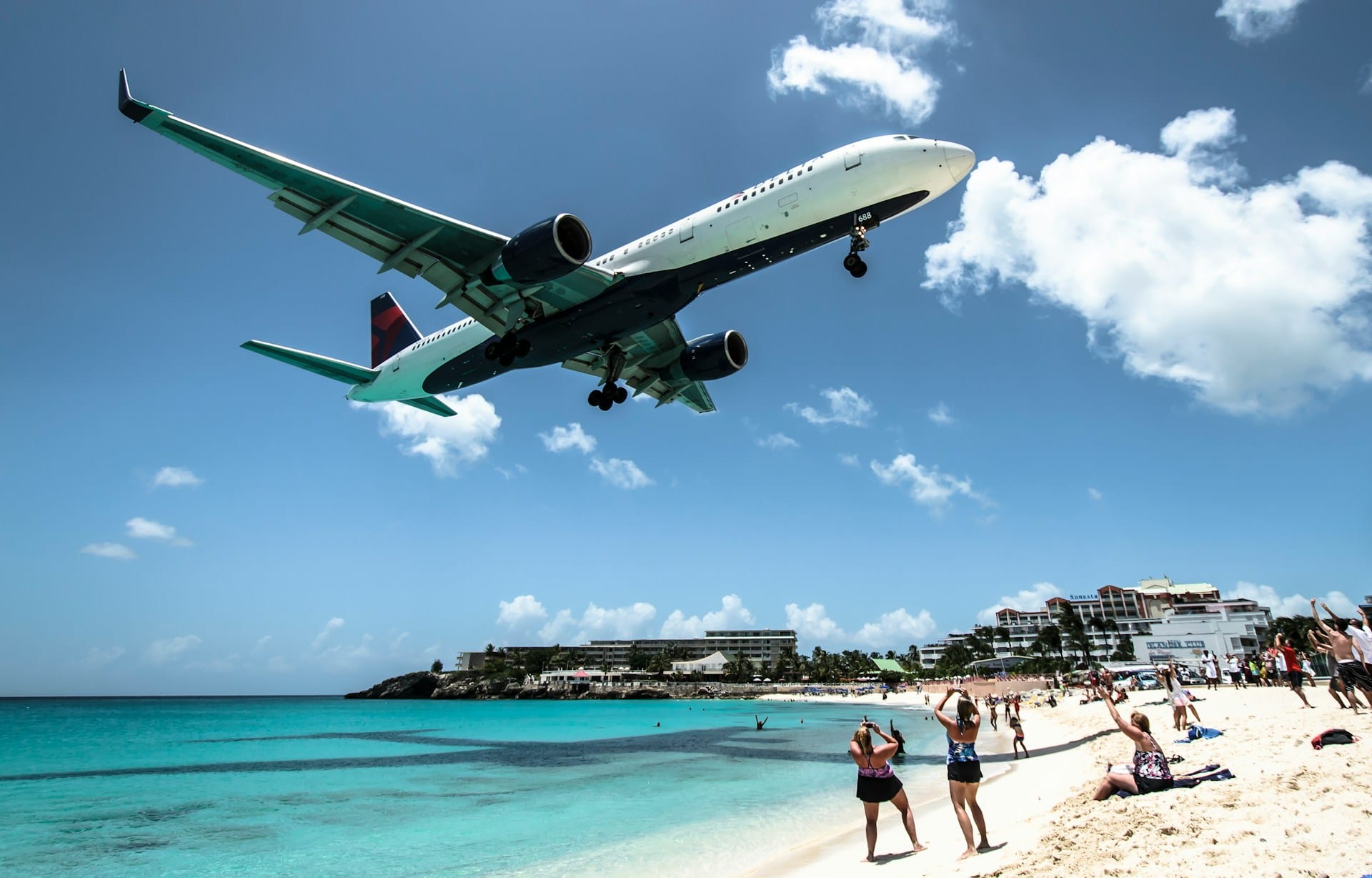
Route Expansion Plans
Delta is aggressively expanding its network, particularly focusing on transatlantic routes for summer 2025:
Largest-Ever Transatlantic Schedule:
- Over 700 weekly flights to 33 European destinations
- 10% increase in service to Italy year-over-year
New Routes:
- New York-JFK to Catania, Sicily (daily)
- Atlanta to Naples, Italy (4x weekly)
- Minneapolis-St. Paul to Rome (4x weekly)
- Boston to Milan (4x weekly)
- Boston to Barcelona (3x weekly)
- Detroit to Dublin (4x weekly)
- Atlanta to Brussels (3x weekly)
Frequency Increases:
- Additional flights to Athens, Barcelona, Rome, Zurich, and Munich from various U.S. hubs
Asian Market:
- Resuming Los Angeles to Shanghai service in June 2025
Technology Investments
Delta is leveraging technology to enhance customer experience and operational efficiency:
In-Flight Connectivity:
- Free, high-speed international Wi-Fi rollout across fleet
Delta One Lounges:
- New premium lounges at JFK, LAX, BOS, and SEA airports
- JFK lounge larger than any Sky Club in Delta's network
Fleet Modernization:
- Increased deployment of A330-900 and A350-900 aircraft on transatlantic routes - Enhanced premium seating across the fleet
Sustainability Efforts
Delta is committed to achieving net-zero carbon emissions by 2050:
Fuel Efficiency:
- Aim to reduce fuel use by 45 million gallons by 2025
- Saved 21 million gallons in 2023 through enhanced winglets, flight optimization, and weight reduction
Sustainable Aviation Fuel (SAF):
- Goal to use 10% SAF on all flights by 2030
- Commitments for over 200 million gallons of SAF annually
- Agreement with Shell Aviation for up to 10 million gallons of SAF at LAX hub
Fleet Renewal:
- Investment in fuel-efficient aircraft like A321neo, A220, and A350 - A321neo is 20% more fuel-efficient than older Boeing 767s and 757s - A220 is 25% more fuel-efficient than Boeing 737-700s and MD-80 series aircraft
Ground Operations:
- Nearly 100% electric ground support equipment at Salt Lake City and Boston hubs - Goal of 100% net-zero ground operation globally
Waste Reduction:
- Testing new paper cups to eliminate 7 million pounds of single-use plastic annually
Delta's strategic initiatives demonstrate a comprehensive approach to growth, customer experience enhancement, and sustainability. The airline's focus on route expansion, particularly in the transatlantic market, coupled with significant investments in technology and sustainable practices, positions Delta to strengthen its market leadership while addressing environmental concerns in the aviation industry.
Competitive Landscape

Delta Air Lines is one of the "Big Three" legacy carriers in the United States, alongside American Airlines and United Airlines. These three airlines dominate the U.S. aviation market.
Key Competitors:
- American Airlines
- United Airlines
- Southwest Airlines (largest low-cost carrier)
Comparison with Other Major U.S. Carriers
Operational Performance:
- Delta consistently ranks highest among major U.S. airlines for on-time performance and reliability
- In 2023, Delta had an on-time arrival rate of 82.97%, compared to 78.89% for United and 76.44% for American
Customer Satisfaction:
- Delta ranked highest in J.D. Power's 2024 North American Airline Satisfaction Study for first/business class and premium economy
- Delta scored 743 out of 1,000 points in first/business class, compared to industry average of 705
Fleet Size:
- Delta: 990 mainline aircraft
- American: 855 mainline aircraft
- United: 812 mainline aircraft
Route Network:
- Delta serves 325 destinations across 52 countries
- American serves 350 destinations in 50 countries
- United serves 342 destinations in 59 countries
Market Share Analysis
Domestic Market Share (Q3 2024):
1. Delta Air Lines: 24.94%
2. United Airlines: 23.01%
3. American Airlines: 22.11%
4. Southwest Airlines: 11.18%
Key Insights:
- Delta holds the largest domestic market share among U.S. carriers - The "Big Four" (including Southwest) account for over 80% of the U.S. domestic market
- Delta's market share has remained relatively stable in recent years, indicating strong competitive positioning
Hub Dominance:
- Delta commands 83% of available seats at its Atlanta hub
- Strong presence in other key hubs like Minneapolis-St. Paul, Detroit, and Salt Lake City
Delta's consistent operational performance, high customer satisfaction ratings, and strong market share demonstrate its competitive strength in the U.S. airline industry. However, the market remains highly competitive, with slim margins between the top carriers.
Delta Air Lines: Industry Challenges and Opportunities

Impact of Fuel Prices
Fuel costs significantly affect Delta's operations and financial performance:
Rising Fuel Costs:
- Oil prices reached a 14-year high in 2022, rising 70% in the first six months - Fuel costs account for 18-20% of Delta's total expenses
Potential Fare Increases:
- Ed Bastian, Delta's CEO, predicts a 5-10% increase in domestic fares due to rising fuel prices
- International flights may see slightly higher increases
Mitigation Strategies:
- Delta does not engage in fuel hedging, citing unpredictability
- Focus on fuel-efficient aircraft like A321neo and A220
- Aim to reduce fuel use by 45 million gallons by 2025
Regulatory Environment
The airline industry faces various regulatory challenges and opportunities:
Existing Regulations:
- FAA oversight on safety, security, and operations
- 120 Open Skies agreements eliminating government interference in routes, capacity, and pricing
Potential New Regulations:
- Biden administration proposing rules for airline compensation for controllable disruptions
- Possible requirements for covering meals and hotel rooms for stranded passengers
Industry Response:
- Delta's CEO warns that additional regulations may lead to higher ticket prices - Airlines may engage in lobbying efforts once specific regulations are proposed
Post-Pandemic Recovery
Delta has shown strong recovery from the pandemic-induced downturn:
Financial Recovery:
- 2023 net income: $4.6 billion, a 3.5 times increase year-over-year - Significant improvement from $12.4 billion net loss in 2020
Operational Readiness:
- Hired and trained over 25,000 employees to meet increased travel demand - CEO Ed Bastian states the airline is "ready" for summer travel season
Industry Outlook:
- IATA forecasts record-high airline industry profits of $996 billion in 2024 - Strong consumer demand for travel persists
Challenges:
- Potential slowdowns in travel demand
- Delivery delays for new aircraft like Boeing 737 MAX 10
- Managing debt accumulated during the pandemic
Delta's response to these challenges and opportunities demonstrates its resilience and adaptability. The airline's focus on operational efficiency, customer experience, and strategic investments positions it well to navigate the complex landscape of the aviation industry. However, external factors such as fuel prices and regulatory changes continue to present ongoing challenges that require careful management and strategic planning.
Delta Air Lines: Future Outlook
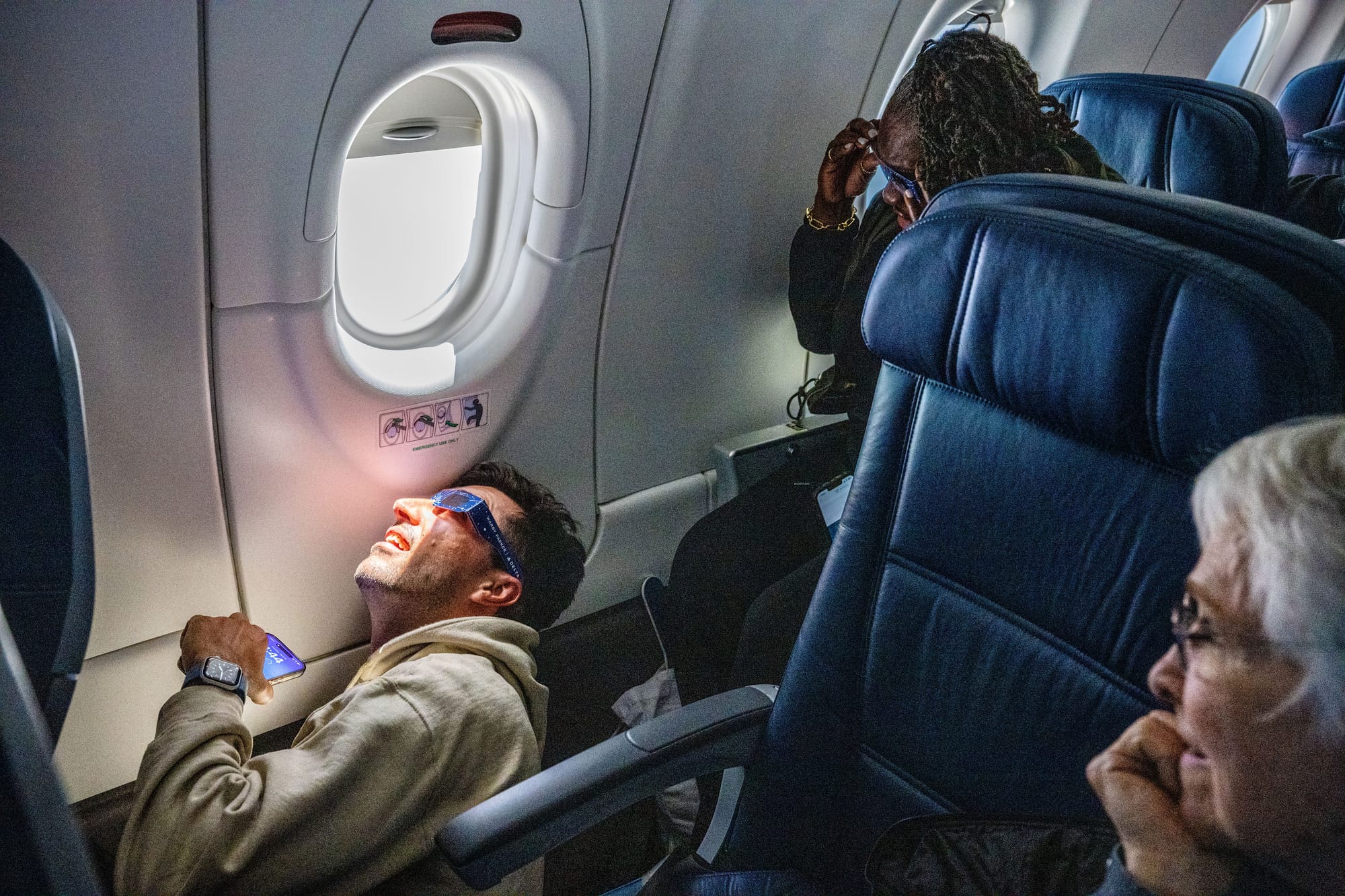
Growth Projections
Delta Air Lines anticipates steady growth in the coming years:
Revenue Growth:
- Forecast to grow by 2.2% per annum
- Q4 2024: Expected total revenue growth of 5-7% year-over-year
Earnings Growth:
- Projected to increase by 3.2% per annum
- EPS growth rate forecast at 4.2% per annum
Financial Targets:
- Full-year 2024 EPS guidance: $6 to $7
- Free cash flow projection for 2024: $3 to $4 billion
Operational Expansion:
- ASM (Available Seat Mile) growth expected at the midpoint of guidance range - Load factor projected at 83.6% for Q4 2024
Upcoming Projects and Partnerships
Delta is focusing on several key initiatives to drive future growth:
Fleet Modernization:
- Continued investment in fuel-efficient aircraft like A321neo and A220 - Goal to reduce fuel use by 45 million gallons by 2025
Premium Seating Expansion:
- Expecting premium seating mix to grow 30% by 2024
- Targeting significant growth in premium seating margin
Digital Transformation:
- Aiming to migrate to the cloud by 2024
- Deploying mainline free in-flight Wi-Fi by the end of 2023
Loyalty Program Enhancement:
- Forecasting strong growth among loyalty customers
- Projecting AmEx Remuneration to reach $6.5 billion in 2023, up from $4 billion in 2021
International Expansion:
- Largest-ever transatlantic schedule for summer 2025
- Over 700 weekly flights to 33 European destinations
- 10% increase in service to Italy year-over-year
New Routes:
- New York-JFK to Catania, Sicily (daily)
- Atlanta to Naples, Italy (4x weekly)
- Minneapolis-St. Paul to Rome (4x weekly)
- Boston to Milan (4x weekly)
- Boston to Barcelona (3x weekly)
- Detroit to Dublin (4x weekly)
- Atlanta to Brussels (3x weekly)
Airport Infrastructure:
- Investments in new facilities at four major airports
- New premium Delta One Lounges at JFK, LAX, BOS, and SEA airports
Delta's future outlook demonstrates a focus on sustainable growth, customer experience enhancement, and strategic expansion. The airline's investments in fleet modernization, digital transformation, and international route development position it well for future success in the competitive aviation industry. However, challenges such as fuel price volatility and potential economic fluctuations remain factors to monitor in the coming years.
Delta Air Lines: Investment Considerations

Stock Performance
Delta's stock has shown strong performance in recent periods:
- Current stock price: $56.31 (as of October 18, 2024)
- Year-to-date growth: Approximately 20%
- 2023 growth: 22%
- 52-week high: $53.9 (reached on October 15, 2024)
Recent Milestones:
- Stock soared to a 52-week high, reflecting a 57.38% increase over the past year - Market capitalization: $34.74 billion
Analyst Recommendations
The consensus among analysts is overwhelmingly positive:
Rating Consensus:Strong Buy
Price Targets:
- Average: $63.29
- High: $85.00 (Morgan Stanley)
- Low: $52.00
The average price target represents a 23.30% upside from the current price.
Key Analyst Actions:
- Morgan Stanley: Reiterated Buy rating with $85 target (50.95% upside) - Bank of America Securities: Raised target from $55 to $60
- TD Cowen: Maintained Buy rating with $59 target
- Susquehanna: Increased target from $50 to $59
Risk Factors
While the outlook is positive, investors should consider several risk factors:
Economic Risks:
- Potential recession impacting travel demand
- Fluctuating fuel prices affecting operational costs
Operational Challenges:
- Labor costs: Recent pay increases for 80,000 workers
- Unionization trends in the industry
Financial Considerations:
- Elevated debt levels (1.6x increase from 2019 to 2023)
- Interest rate sensitivity: Higher rates could impact net income
Industry-Specific Risks:
- Competitive pressures from low-cost carriers and legacy airlines - Regulatory changes in aviation and environmental policies
External Factors:
- Geopolitical events affecting international travel
- Potential health crises impacting global travel patterns
Delta's strong financial performance, positive analyst sentiment, and strategic initiatives position it favorably in the market. However, investors should weigh these opportunities against the identified risks when considering an investment in Delta Air Lines.
